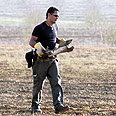
3 Qassams fired at Israel Thursday morning
Attempts to hit western Negev communities continue, following record number of rockets fired Wednesday since ceasefire was declared; one rocket out of three fired Thursday morning lands in Israeli territory. Army chief on restraint: 'PM sees a broader picture than the military context'
Two of the rockets fired Thursday landed in Palestinian territory, and one landed in Israel.
The Sderot Municipality reported that the Color Red alert system identified the launching of a rocket at the western Negev at around 6:20 a.m. The landing site has yet to be located, but the rocket apparently landed in an open area outside the southern town.
Wednesday saw a record number of Qassam rockets launched in one day during the ceasefire which was declared last month. In total, seven rockets were fired on Wednesday and during the night, landing in the western Negev.
At least 40 rockets were fired from the Gaza Strip since the truce came into force.
A senior Israel Defense Forces official, talking to Ynet, warned that “Israel’s policy toward the incessant Qassam rocket fire may be interpreted as a sign of weakness.”
Ynet has learned that the IDF recently decided to remove artillery batteries that were placed around the Gaza Strip a few months after the disengagement, this following the errant fire on Beit Hanoun and the truce.
Defense Minister Amir Peretz said Wednesday evening that Israel would rethink its policy of restraint should Palestinian terror groups continue to breach the ceasefire. He noted that the continuous fire of Qassam rockets from Gaza into Israel is a blatant violation of the ceasefire.
"Israel has no intention to gamble with the safety of its citizens, there is a limit to our restraint," said Peretz.
Prime Minister Ehud Olmert also warned, during a meeting with his Norwegian counterpart Jens Stoltenberg, that Israel's restraint to ongoing violations of the ceasefire in the form of rocket attacks at southern Israeli cities would soon end.
"Over 40 rockets landed in Israel since the ceasefire and the last one was fired as we speak," Olmert said, referring to a Qassam rocket fired from the northern Gaza Strip at the western Negev by Islamic Jihad gunmen.
"Sometimes the difficulty has to do with others, who do not see the overall and complex picture we are experiencing in this part of the world. That is why we meet and speak and exchange views. I think this is the important thing, and not the words were sometimes hear and do not feel comfortable about," the prime minister added.
Halutz: Military need is not everything
IDF Chief of Staff Dan Halutz referred Thursday morning to Israel's restraint in an interview with Army Radio.
"When the prime minister decides to hold back, he is doing it out of a broader outlook than the direct military context of the need to respond to the Qassam fire. The military need alone is not everything," Halutz said, adding that "the right of self-defense is a right reserved to anyone."
Referring to the commission of inquiry into the Lebanon war, Halutz said, "My truth is my truth, and I don’t plan to deviate from it and invent things. I will not make any special preparations because I do not believe I am coming to compete with Israel. I will not rent a lawyer in any case."
Once the ceasefire was declared, Olmert instructed the IDF not to respond to the Qassam fire and not to fire at launching cells. Defense Minister Peretz proposed to give the IDF freedom of action.
Eventually, Olmert's suggestion was accepted. Since then, the IDF does not fire at launching cells, even when they are spotted. The IDF's stance on the issue is to receive more freedom of action and respond to the fire, but in the meantime there has been no change in instructions.
The IDF recently removed the cannon battery stationed north of the Gaza Strip, as well as the one stationed on the southern part.
Following the Beit Hanoun incident about two months ago, in which Palestinians were killed as a result of a malfunction in the system, it was decided that shells would only be fired following a major general's approval, which means a significant reduction of the fire.
After the ceasefire it was decided that there is no additional operation reason to leave the batteries in the area, and therefore they were removed from the area. The cannon batteries fired tens of thousands of shells at the Qassam launching sites, both for deterrence and as preventative fire.
Military sources noted that if needed, the IDF would re-station the batteries according to operational needs.
Hanan Greenberg contributed to the report










